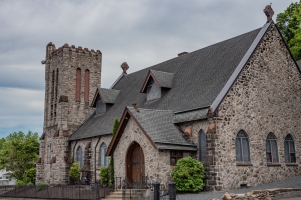
In Hawaiʻi, religious organizations are local centers for community support, outreach, and fellowship. They function as businesses, but they are also cultural touchstones that need to be protected beyond their practical needs. As both a business and an institution with distinct cultural responsibilities to its volunteers, employees, and members, these groups must predict, prevent, and be prepared for liabilities of all kinds.
Many of these liabilities are common to all businesses in Hawaiʻi while others are specific to religious responsibilities. Religious leaders should always remember that their ministry and service comes first, which in this case means proactively protecting their congregations, members, and employees with the right insurance provisions.
This article looks into both the standard and unique insurance coverages that religious organizations in Hawaiʻi need, and provides risk management tips to help leaders serve their ministries with the best protection.
Why Religious Organizations Need Insurance
Religious organizations, such as churches, mosques, temples, faith centers, and others, experience many of the same liabilities as other businesses. These include:
- Property damage associated with weather conditions and other disasters
- Worker liability, including work-related accidents
- Visitor liabilities, including slip-and-fall accidents
- Professional liability, including fund mismanagement
- Theft and vandalism of church resources
These liabilities, typically experienced by businesses in any industry, can lead to unexpected costs, including property replacement, operational downtime and lost income, legal fees, and more. In addition to these, religious organizations also have to be prepared for:
- Volunteer-related Risks: Volunteers may have an accident on the job, mishandle a visitor, misappropriate funds, and more.
- Youth-related Risks: Youth-related misconduct, accidents, or mismanagement can impact church-sponsored events, retreats, and other programs.
- Misconduct-related Risks: The risks of misconduct, including financial mismanagement, come with greater potential costs for religious organizations, whose reputations are at stake.
- Downtime-related Risks: When churches temporarily close due to lawsuits or other causes, restarting operations may be more difficult compared to other types of businesses.
Proper insurance coverage allows religious organizations to keep their doors open even in the wake of unexpected events, including those that are distinct to its practices and those that all businesses experience.
Core Insurance Coverages to Consider

When planning an insurance strategy, religious organizations should consider these types of core coverage:
- General Liability Insurance: Covers injuries, accidents, and property damage sustained by visitors, not only on the property but also during events, services, and activities
- Property Insurance: Covers damage to buildings, equipment, furnishings, and other assets due to common perils like theft, fire, natural disasters, or vandalism, not only for the worship space but also for its event spaces and centers.
- Workers’ Compensation Insurance: Required by Hawaiʻi law for any business with employees to cover job-related injuries or illnesses, even for part-time staff and custodians
- Pastoral and Leadership Liability: Covers clergy and church board members in the event of lawsuits related to allegations of misconduct, mismanagement, or counseling-related offenses, also known as Directors and Officers (D&O) coverage or Pastoral Professional Liability
- Abuse and Molestation Coverage: Although a sensitive subject, this liability protection is important for organizations working with youth and children and should be added to policies for potential allegations
- Auto Liability Coverage: Provides coverage for the organization’s vehicles, both church-owned and privately owned, when transporting supplies, children, or congregants, and may include coverage for volunteer drivers with the right policy endorsement
- Event Insurance: Provides short-term increases in coverage for liability, property damage, and cancellations during off-site or large events, such as fundraisers, retreats, or community gatherings
- Cyber Liability Insurance: Essential coverage for data breaches, hacking, and the costs of losing sensitive information from donor data, online giving platforms, employee information, and membership databases
Unique Considerations for Hawai‘i-Based Facilities
In Hawaiʻi, religious organizations often experience distinct or increased risks compared to other regions, such as hurricane, flood, volcano, and tsunami damage that can interrupt their ability to serve their communities.
Establishing or growing an organization can be challenging as many buildings in Hawaiʻi are heritage properties located on sacred, culturally significant, or leased land, creating unique permitting and leasing considerations for businesses planning expansions.
Equally important is the practice of proactively addressing community concerns to maintain trust. Because land use and heritage preservation are deeply valued in Hawaiʻi, organizations must first consider how facility changes may impact or be impacted by customs, culture, and public perception. Making a point of connecting early on with local leaders and councils helps guide decisions and strengthen community relationships.
Risk Management Tips for Religious Leaders

When managing risk and upgrading or searching for insurance policies in Hawaiʻi, religious leaders should:
- Conduct regular property and safety audits to identify potential coverage gaps
- Provide training for staff, including volunteers, on safety, liability, and cultural practices
- Maintain updated records of insurance policies, assets, contacts, cyber security measures, and vendor agreements
- Establish guidelines and training for good behavior and reporting policies for all youth and outreach programs
- Maintain good relationships with local cultural and community leaders
- Work with local insurance advisors who are familiar with religious organizations, cultural customs, and heritage properties in Hawaiʻi
Speak with Local Insurance Experts to Protect Your Religious Organization in Hawaiʻi
At Atlas Insurance, we customize insurance strategies to help religious organizations cover their property, reputation, assets, volunteers, and employees from risk. Our local insurance experts recognize the distinct issues Hawaiʻi’s religious organizations are exposed to, in addition to standard issues that impact all small businesses.
Contact our team today to learn how to protect your religious organization, including your members, clergy, and youth, from liability while maintaining good cultural and social standing in your Hawaiʻi community.
